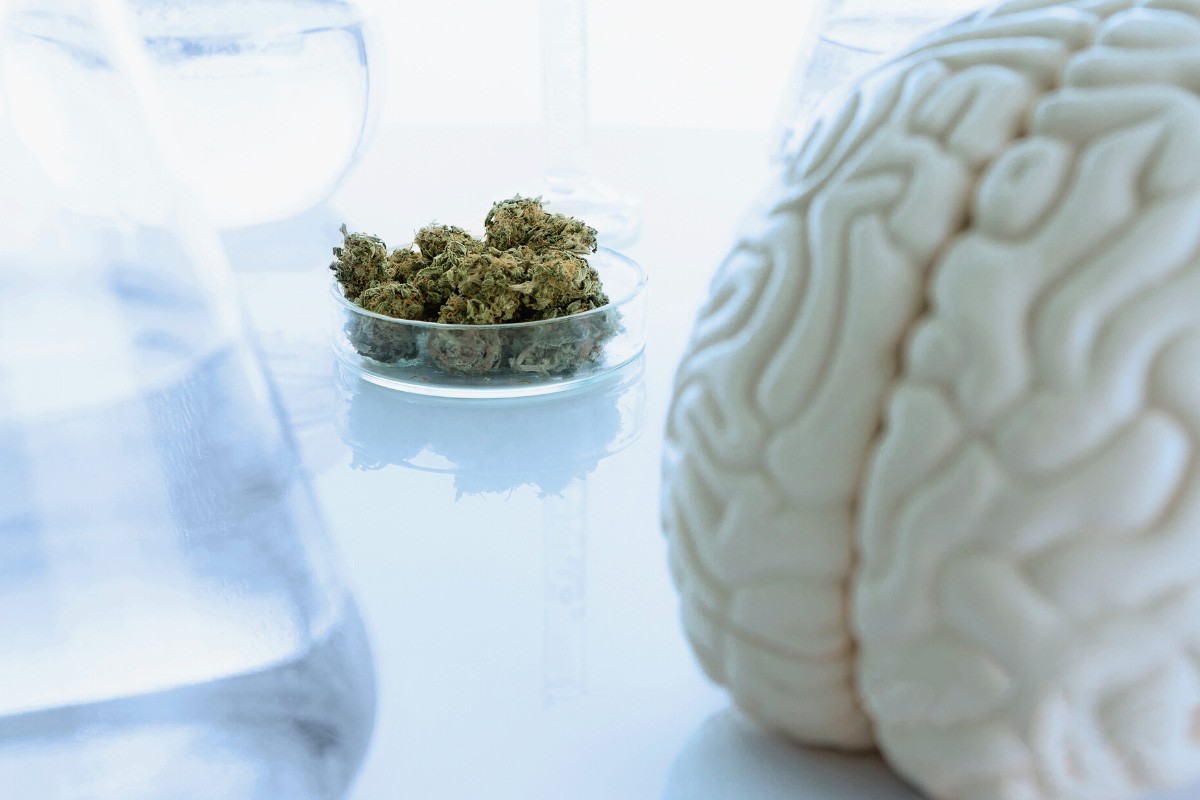The positive properties of medical cannabis on the mind of patients have been suggested by strong evidence. Often an improvement was observed in these groups, as the use of e.g. cannabis in pain therapy could increase the quality of life of cannabis users by reducing their symptoms [1]. Patients with anxiety disorder could also benefit from cannabis, as cannabidiol (CBD) is non-psychoactive, anti-depressant and can help in the treatment of psychosis [2,3]. However, there are still uncertainties about consequences and about its use in mental illness.
In the following article, you will learn why there is a significant difference in cannabis preparations and between their effects on the psyche, and for what reasons common misconceptions arise.
Cannabis and the brain:
A broad spectrum with many misconceptions
Since the new German coalition promised legalization under controlled release, the psychoactive cannabinoid THC in particular has come under a new awareness. In the medical community, the differentiated effects of the cannabinoid spectrum between THC and CBD have been researched and evaluated for some time, as has the differentiated risk of psychosis when using cannabis. However, debates about recreational use and its considered risks of marijuana to the brain outshine medical research findings and patient reports of controlled cannabis use. Both, research and reports, explain on the added value of cannabis as a pain-relieving or anti-inflammatory drug. This is because for certain groups of patients, cannabis may provide psychological relief and be associated with an increase in quality of life [4], such that it could reduce or partially replace the use of other medications [5,6]. The medical instruction in cannabis use (CBD) is thereby used to counteract the risk for psychosis.
As it happens so often in press controversies, a focus on the negative effects of marijuana on the brain therefore circulates in the media. What is often meant here, however, is not marijuana as a medicine. Prominently presented studies rather include street marijuana, i.e. preparations from the black market, whose substantial composition is almost never known and can be highly harmful to health due to extenders. Certain added and highly potent active ingredients, such as synthetic cannabinoids, carry a complex risk of inducing psychosis [7]. Recreational, uncontrolled cannabis use should be clearly distinguished from medical cannabis in essence.
Is Marijuana bad for the brain?
The overshadowing effect by the media controversy
In some articles, references to “marijuana use and depression”, psychosis or schizophrenia can be found, but these lack a decisive and differentiated consideration: without medical accompaniment, it is not a medical benefit of marijuana. The therapeutic efficacy is only significant if the dosage of the medically controlled preparations is managed under professional hand. Decisions are justified only on the basis of valid studies that deal exclusively with the medical benefits and are specifically oriented to the illnesses of the patient. The risk of psychosis is assessed in advance through extensive medical screening. Just as with other prescription medications, a risk of psychosis or corresponding predispositions requires a precisely dosed medication and the right dosage of active ingredients, where the psychoactive THC is not the sole determinant of cannabis medication. Many of the conditions being considered for cannabis-based therapy invoke the cannabinoid CBD, which is functionally antagonistic to THC and is not known to cause psychosis. On the contrary, according to studies, CBD has an anti-anxiety or anti-psychotic effect and is even said to be suitable for therapeutic or adjunctive use in the treatment of psychoses [3]. A generalization that marijuana overall increases the risk of triggering a psychosis is therefore not supported by studies.
Different effects of cannabis on the brain:
Street marijuana and dosing with medical cannabis
Other considerations of the black market are trending, for example, based on the annual drug and addiction reports in Germany [8], which report increasing levels of recreational use among youth. Also, these articles generalize the average increasing tetrahydrocannabinol (THC) content of marijuana, depending on the preparation, from 6.8 percent to over 20 percent [9], even though the used studies are only and commonly considering black market cannabis. These highly potent, uncontrolled-dose preparations could endanger recreational users.
However, what direct relationship this high-potency THC-laced marijuana has with psychosis and irreversible cognitive damage could only be surmised from a few studies, none of which are long-term studies. However, the evidence suggests that developmental losses in adolescent’s brains occur when uncontrolled recreational use of high-potency marijuana occurs over a prolonged and regular period. Another criterion might be, how early in their recreational marijuana use the subjects began resorting to dangerous black-market preparations. Studies on cognitive performance and medical cannabis, however, could differentiated contradict the previous generalized observations on psychosis risk and cannabis [10].
Therapy for adolescents is still possible despite the study situation, but is subject to very strict regulations of which cannabis-specialized physicians are aware. Finally, all patient groups are not supplied with black market preparations. Adolescents and young adults are also not allowed to be treated with CBD without medical consultation [11].
Positive influence of cannabis for the mind in therapy-resistant symptoms
For some people, controlled-cultivated and -dispensed medical marijuana is an alternative when other treatment attempts conclude or even led to therapy-resistant pain and disease symptomatology. In other words, marijuana in Germany may only be used in treatment under these diagnostic conditions, since the “Act Amending Narcotics Law and Other Regulations” (March 2017). The spectrum of disease patterns considered for this purpose is growing along with the evidence that researchers are increasingly trying to approach and agglomerate. Away from study results, cannabis patients and their families report symptom-relieving benefits and how cannabis has a positive impact on the psyche in these cases. Articles that generalize cannabis as a “dangerous recreational drug for young people” and attribute cannabis for the brain a general risk of psychosis thus harm this already burdened group of patients, as they either suffer from the negative image or are made insecure.
Statutory health insurance companies in Germany are also hesitant to cover the costs of marijuana-based therapy models, despite the 2017 law, as the effect of individual medical support and the increasing competence of leading experts has so far been underestimated.
The effectiveness in a variety of diseases could be ascertained using real-world data. These are sources that do not consist of traditional clinical studies but, for example, validated questionnaires. In a Canadian study from 2021, more than 60% of the patients surveyed reported an improvement in their symptoms. In the surveyed part of chronic pain patients, an increase in the quality of life could also be determined, so that cannabis can definitely have positive effects on the mind [12].
Differentiated spectrum of effects of cannabinoids on brain and diseases
Thus, isolates and preparations with CBD can be used not only for physical, but also mental disorders; successfully, as the majority of the anxiety symptom patients in the Canadian study reported. CBD in particular seems to have an antidepressant effect compared to the psychoactive THC and would thus be a relevant research candidate for expanding the evidence around the effects of cannabis on the brain and overall health.
In addition to the direct influences of marijuana on the brain and pain symptomatology of patients, the influences of CBD- and THC-containing drugs also have an uplifting character. Studies on cannabis in Crohn’s disease, for example, report a potentially reduced risk during surgery. Thus, both the patients and the physicians could adjust to a more pleasant treatment climate [13]. The topic of effects of cannabis for brain and mind can therefore not only explain the effect of cannabinoids on the nervous system, but also strengthen the general mindset when taking medication. In a study on the efficacy of cannabis in palliative care, it is recommended that it only find a practical use if patients already had a recreational relationship with cannabinoids [14]. Due to the stigmatization and social criminalization of marijuana patients, it is reasonable to conclude that patients generally or without previous touch points would not be interested in the efficacy of cannabis preparations for psychological relief. If the evidential focus were on this efficacy and if the positive reports of treated marijuana patients were given a greater hearing, more qualified assessments of patient readiness could probably be made.
Marijuana and its long-term effects in society
In addition to the consequences of inappropriate use of cannabis for the individual brain described before, various long-term scenarios for the mindset of a cannabis-open society arise. These scenarios are important for the medical benefit and its patients as they suffer or benefit from the prevailing image of cannabis. Therefore, when legalizing marijuana in Germany, it should be noted that the difference between medical marijuana and recreational use should be clearly delineated in order to provide greater protection for patients, for their sense of safety when dealing with medication, and thus for their mindset. Also, the tax revenues generated from the sale of cannabis should then be invested in prevention and counseling measures to protect recreational users from the dangers of uncontrolled doses or contaminated preparations. To build the evidence for a better distinction between recreational marijuana use and cannabis treatment, some of these funds could be directed toward improving the structure of medical care and the research situation.








